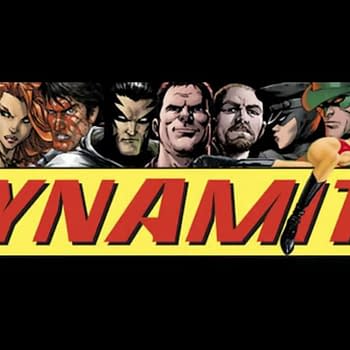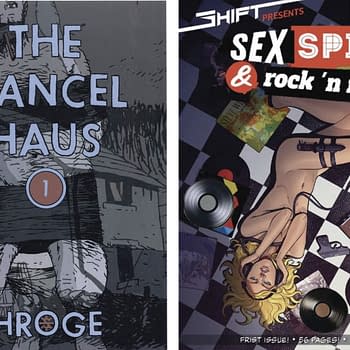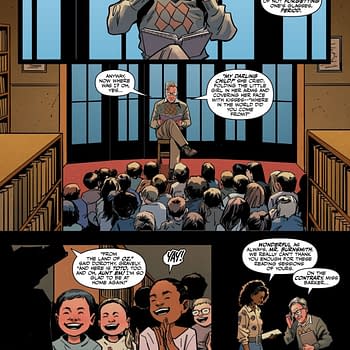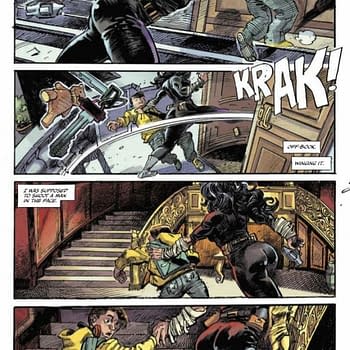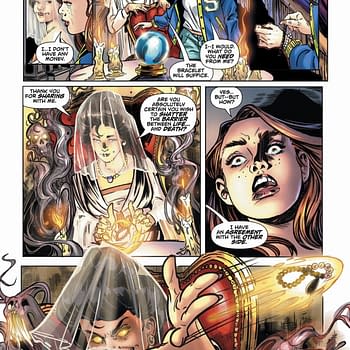Posted in: Comics | Tagged: call of duty, games, halo, shoot em up, spec ops, the line
Look! It Moves! by Adi Tantimedh: Twilight Of The Shooters
Adi Tantimedh writes for Bleeding Cool;
There's been a lot of talk this year about shooting games signaling the death-knell for the video game industry in its current state. There are simply too many of them dominating the market now, and games companies are investing the greatest amount of money in games with shooting in them than other types of games.
Critics are saying the games industry could be heading for a crash if no new innovation in game design is introduced and the studios stick to regurgitating shooters over and over again. When the CALL OF DUTY series makes more money in sales in a shorter time than most Hollywood blockbuster movies, everyone takes notice. And typical of media industries, when they hit upon a winning formula, they'll keep tapping it until it's dead, then panic when there's nothing to replace it. The sheer number of shooting games coming out just this year threatens to bleed into each other, from CALL OF DUTY: MODERN WARFARE to BATTLEFIELD 3 to CALL OF DUTY: BLACK OPS to MEDAL OF HONOR: WARFIGHTER to the next HALO to another FAR CRY.
I think it was The Brainy Gamer website that said that shooting games are entering their dying, decadent phase just like the Western did in movies in the late 1960s and 1970s. When the Western entered its twilight, odder, trippier, more subversive entries were made, like McCABE AND MRS MILLER, THE HANDYMAN, some genuinely bizarre Spaghetti Westerns like KEOMA and FACE TO FACE. There's some evidence that even the makers of shooting games are starting to chafe against the restrictions or clichés of the genre in recent games.
SPEC OPS: THE LINE has been getting a lot of critical praise in the last two months for its subversive story and use of an unreliable narrative to tell a story that goes against the right-wing, gung-ho ethos of military shooter games. Influenced by Joseph Conrad's "HEART OF DARKNESS", THE LINE sends a three-man squad into a Dubai that's been buried in a sandstorm to find out what happened to a platoon led by a legendary leader that went rogue six months ago to help evacuate civilians from the city and were never heard from again. There the squad finds itself having to fight not only insurgents but rogue American soldiers and CIA agents who have become entrenched in the city to carve out their own fiefdoms, fighting against each other for dominance over the territory. The story starts out as another military Third Person Shooter, but starts to call into question the hero's actions, his insistence on pushing ahead rather than obeying the original orders of his mission, which is to just recon the city and return to base with a report. As he pushes deeper and deeper into the city to find the commander he idolizes, he comes to do worse and worse things, and his sanity might start to unravel. This culminates when he's forced to do something truly horrific and things just get even worse from there. SPEC OPS: THE LINE wants players to question the bloodthirsty nature of shooter games and their feelings of moral justification in shooting people in a game's story. It refuses to accept the convention moral superiority of the soldier hero of shooter games and the convention where the hero goes against orders and orders his squad to push on ahead when they're horribly outnumbered and have no idea what they might be in for. The story overturns the moral superiority or justification of the military shooter genre and, on a broader level, questions the idea of American exceptionalism. Everyone in the story set out with the best of intentions and only end up making things far worse, losing their minds and souls in the process. The fog of war makes monsters of those who fancy themselves heroes.
SPEC OPS: THE LINE isn't going to kill off the military shooter anymore than WATCHMEN killed off the superhero genre, but its existence suggests the creative cracks and fissures the makers of such games are starting to experience in trying to make yet another one. You probably wouldn't be surprised to hear that SPEC OPS: THE LINE, despite all the acclaim, has not sold all that well. I assumed this was largely because 1) it's not called CALL OF DUTY, 2) buyers thought it was just another run-of-the-mill shooter and preferred to wait for the next CALL OF DUTY. I suppose the game will develop a cult following from people who appreciate titles that try something different with storytelling in games, but by now, anyone who wants to play it will have read the reviews and analyses from the reviewers and critics who admire the game. I can appreciate how books, movies and TV that overturn expectations and are downbeat earn respect for challenging accepted conventions and attitudes but I wonder how much impact a game like SPEC OPS: THE LINE will have. The difference that games have over books, movies and TV is that their stories are interactive, and are generally popular for giving the player a sense of empowerment and escapism. What SPEC OPS: THE LINE does is make the player feel like utter shit, ashamed and guilty for playing through the game shooting and killing people who turn out not to deserve it. Does it actually make business sense to ask a player to pay $60 to be told he's a horrible person for wanting to shoot people? Do games have as much a license as books, movies or TV to make the audience feel like shit when people play games to have fun? We might want to go to a book, movie or TV show for more than entertainment – we decide to look for ideas and insights that contemplate the complexities of life and the human condition that aren't always comforting but make us wiser. Should we demand that of games as well? Do we really want to play games as if it's medicine or homework like we might do with films and books? Does it make sense to fork out a lot of money for a game that basically dares you to stop playing it and walk away? I speak as someone who hasn't played SPEC OPS: THE LINE but has read all the critiques and found out everything about the story and how it ends. While I admire what it sets out to do, it doesn't make me want to buy or play it.
And that, I think, is the conflict between Art and Commerce.
Lining up headshots at lookitmoves@gmail.com
Follow the official LOOK! IT MOVES! twitter feed at http://twitter.com/lookitmoves for thoughts and snark on media and pop culture, stuff for future columns and stuff I may never spend a whole column writing about.
Look! It Moves! © Adisakdi Tantimedh








